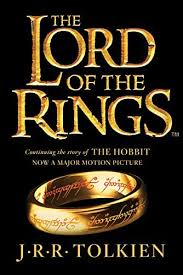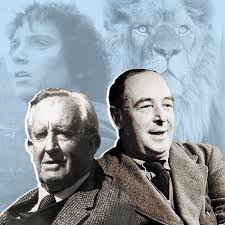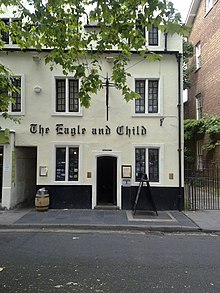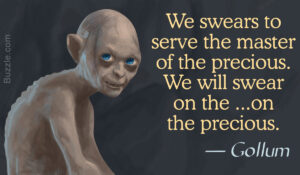NOTE: I recently wrote a post inspired by The Lord of the Rings. Since it was published I’ve had a number of additional thoughts about this literary masterpiece, which I share with you now. ~ Pat
Storytellers are gatekeepers to our conscious selves — where we learn everyone’s story is our story.
Thank you to:
- Homer, for The Iliad and The Odyssey;
- Dante, for The Divine Comedy;
- J.K. Rowling, for the Harry Potter books;
- A.A. Milne, for the Winnie-the-Pooh books.
Perhaps no book demonstrates the interplay between history and storytelling better than J.R.R. Tolkien’s trilogy, The Lord of the Rings.
This story describes a mythical war fought in a mythical land between mythical characters who represent the eternal forces of good and evil, death and immortality, fate and free will — for the control of the Ring, whose power was both addictive and deadly.
Sound familiar?
The books have thrilled readers since first published in 1954, so much so that in a recent poll the English people voted The Lord of the Rings their all-time favorite book.
There’s an interesting backstory as to how the books came together.
As the story goes, writers J.R.R. Tolkien and C.S. Lewis collaborated on the story, its setting and characters. The men were both Oxford dons (professors) and veterans of the First World War.
Both men had seen bloody fighting on the battlefields of Passchendaele and the Somme and had their faith in God, humanity and the universe shattered by what they had witnessed.
So it was that two shattered men, wanting to recover their faith in God, humanity and the universe, wrote some of the most memorable books of all time.
They wrote not as theologians but as storytellers, but storytellers with deep theological clarity and an unflinching regard for truth about the human condition.
They invented rich mythological worlds, with unforgettable characters, engaged in fantastic adventures — stories that were imminently relatable for any audience in any time period.
Tolkien and Lewis met each Tuesday evening at The Eagle and Child pub in Oxford, and over pints of ale, developed the story lines. It was out of these weekly soirées that The Lord of the Rings came to be.
Oh, to have been a fly on the wall…
The Lord of the Rings explores one of the oldest themes in human history — the corrupting influence of the lust for power.
“’Precious, precious, precious!’ Gollum cried. ‘My Precious! O my Precious!’ And with that, even as his eyes were lifted up to gloat on his prize, he stepped too far, toppled, wavered for a moment on the brink, and then with a shriek he fell. Out of the depths came his last wail ‘Precious!’ and he was gone.”
Equally so the Lord of the Rings is an exploration of one of the most redemptive themes in human history — that real heroes are to be found not among the high and mighty, but in the least among us.
“Some believe it is only great powers that can hold evil in check but that is not what I have found. It is the small ordinary deeds of common folk that keep the darkness at bay. Small acts of kindness and love.” ~ Gandolph, from The Lord of the Rings
In this sense, The Lord of the Rings is truly a story for our time.
We witness the same maniacal lust for power and the ruination that follows. Indeed, the same response is being asked of us:
”Your time will come. You will face the same evil and you will you defeat it.” ~ King Aragorn, from The Lord of the Rings
Let’s remember the moral of this great story:
- Power is found in powerlessness,
- Heroism in friendship, and
- Redemption in sacrifice.
Something great awaits us in this, our moment, in history. “And pray God this will be said of us; A day may come when the courage of men fail ……. but it is not THIS day.” ~ King Aragorn, from The Lord of the Rings
Truly a story for our time.
Just a Thought…
Pat
Copyright © 2022 Patrick J. Moriarty. All Rights Reserved.
Would you like to submit a post to Just A Thought? To learn more, please click here.




